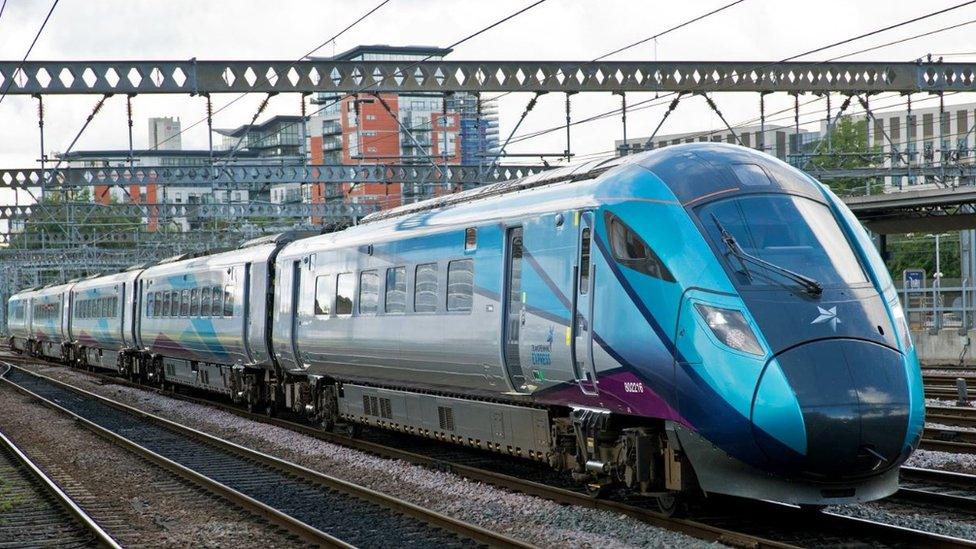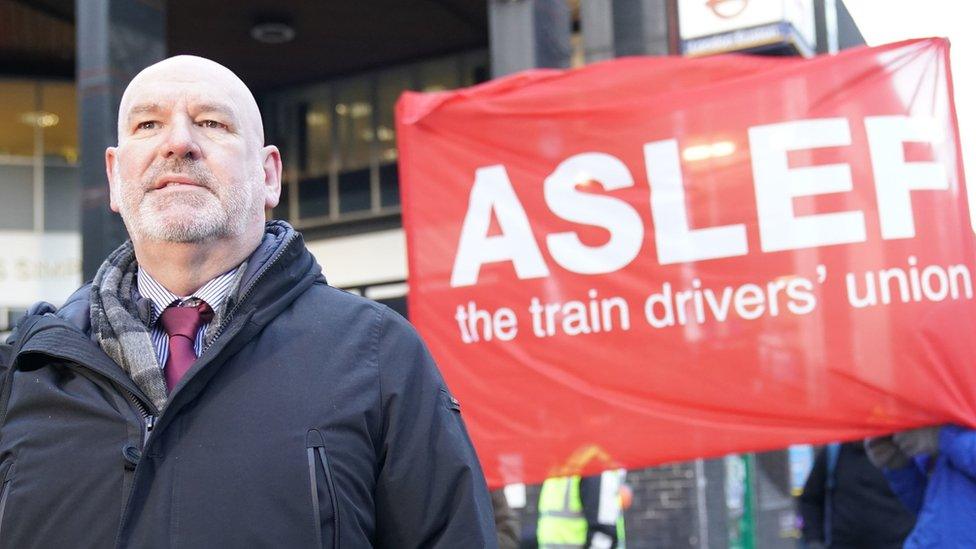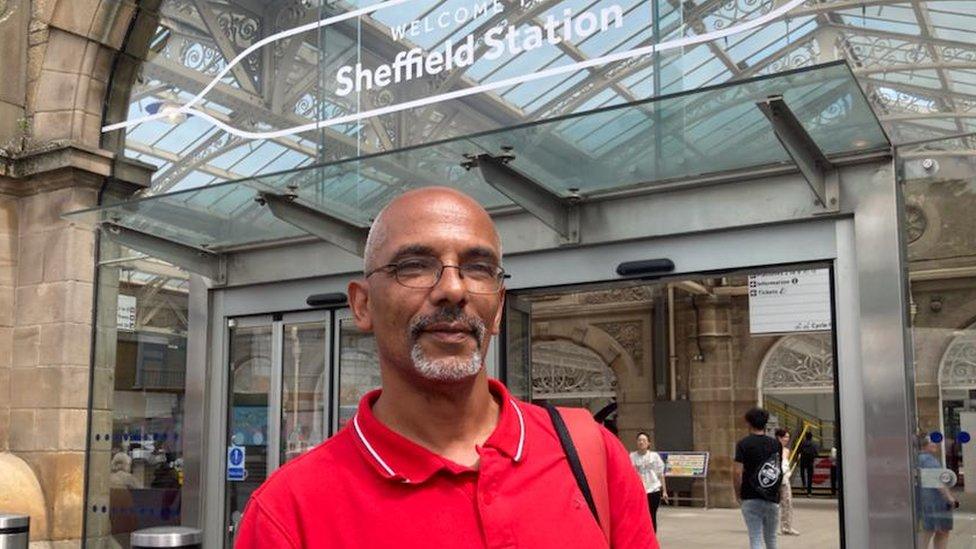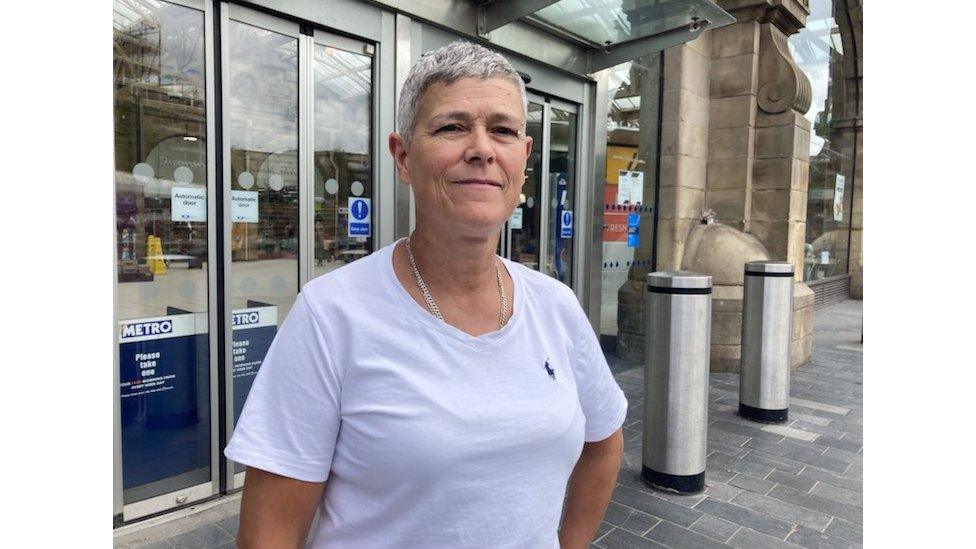TransPennine Express: Staff shortage blamed for 'essential only' travel warning
- Published

Services have suffered from widespread delays and cancellations over the past year.
TransPennine Express (TPE) customers have been urged to only travel for "essential journeys" due to disruption on key routes on Friday.
TPE said it had to reduce services across northern England and Scotland because of "operational issues," including a lack of train crew.
Managing director Chris Jackson said there was also a "significant backlog in driver training".
He apologised to customers and warned of possible delays or cancellations.
Anyone who needs to travel on Friday is advised to plan ahead, allow extra time for travel or use alternative transport, TPE said. Services run by other operators are also expected to be busier than normal.
The affected routes include:
Liverpool/Manchester - Newcastle
Liverpool - Hull
Manchester Airport - Saltburn
Manchester - Scarborough
York - Scarborough
Manchester - Huddersfield
Huddersfield - Leeds
Newcastle - Edinburgh
Mr Jackson said: "We regret that we need to run a reduced number of services today, which is due to operational issues, including a lack of available traincrew.
"We have been clear so far that some of the challenges we have inherited include a significant backlog in driver training and only 50% of drivers being currently equipped to drive the trains and routes in their roster."
He said that from next week, "rest day working" would be reinstated at TPE which would increase driver training and, in turn, contribute towards "a more stable service for passengers."
"We are also working hard on operational plans to deliver a long-term improved service for our customers," he added.
"We apologise again to all our passengers during this period."

The Aslef union's general secretary Mick Whelan had welcomed an end to a driver overtime ban at TransPennine
Earlier this month the firm said a long-running overtime ban by drivers, which had caused cancellations and delays for commuters, would end on 24 June..
Drivers' union Aslef had previously clashed with TPE over what it said was a "failure" to recruit enough drivers.

Analysis: Spencer Stokes, BBC Look North Transport Correspondent in Leeds
Today's warning not to travel is highly unusual because it isn't related to weather or an emergency, it seems to be a continuation of the main issue TPE has been facing for months - a lack of train drivers.
On one day in January 2023 nearly half of the 330 daily trains the company should operate did not run, leading to TPE being nationalised at the end of May.
The new management team warned that the service level was likely to deteriorate further before a gradual improvement.
An overtime ban by the Aslef train drivers' union which prevented train drivers working on their days off has now been lifted.
That should make it easier for TransPennine to operate all its services.
But a larger-than-expected number of drivers left the company when it changed owners on 28 May, creating a fresh challenge for the government-owned company.
Additionally, this week has seen engineering work on the north TransPennine route as part of a major upgrade programme with no trains running between Leeds and Huddersfield.

Despite the end of the ban, drivers at 16 rail operators, including TPE, announced they would refuse to work on six days next month.
Aslef said its members would withdraw non-contractual overtime - known as rest day working - from Monday 3 July to Saturday 8 July as part of a dispute over pay.
The action coincides with the first week of the Wimbledon tennis tournament and will affect companies such as Avanti West Coast, East Midlands Railway LNER, Northern Trains and TransPennine Express.
Anyone making an essential journey with TPE on Friday is advised to check their train before they travel via the TPE website or using National Rail Enquiries.
Customers with tickets for Friday who choose not to travel can claim a full refund at their point of purchase or use their tickets up to and including Monday 26 June.

Alan Dawson called for rail fares to come down
Speaking at Sheffield station on Friday, Alan Dawson, 56, from London, said he had faced "frustrating" disruption to his journey from Liverpool to Loughborough.
He told the BBC: "The staff at Manchester were really helpful and now I have to get three trains, which is still a hassle but better than four.
"I found out about the disruption when I got to the station. I wasn't surprised because it's a regular occurrence."
Mr Dawson added that he believed train tickets were too expensive and argued prices had increased despite the standard of service dropping.
"I only take around five or six trains a year. There would have to be a real incentive for me to start using it more regularly. Fares would have to come down."
Meanwhile, Lorna Hurst, who had travelled from Nottingham with her friend and two cats, said the East Midlands Rail service was so busy, catering staff were unable to push the trolley through the train.
The 30-year-old said: "There were meant to be four train carriages, but they shut two. Everyone had to stand really close together. We literally had to stand outside the toilets."
Ms Hurst added she was "annoyed" seat reservations had not been honoured on her journey to Cleethorpes via Sheffield on Friday, which was delayed by 22 minutes.

Jane Anderson, from Loughborough, said she was satisfied with her journey on Friday
However, not everyone had experienced major disruption on the network on Friday.
Jane Anderson, from Loughborough, told the BBC her journey in first class to Sheffield had been a smooth one.
Describing scenes on the train as "normal", she said she was happy her connecting train was only delayed by five minutes.
But Ms Anderson, 54, a frequent public transport user, said she generally found train services to be "unreliable" and was often faced with timetable changes or cancellations.
"More trains or more carriages on the trains are needed," she said.
"They are also too expensive. Often you pay for a seat and then don't get it."

Follow BBC Yorkshire on Facebook, external, Twitter, external and Instagram, external. Send your story ideas to yorkslincs.news@bbc.co.uk, external.
- Published26 May 2023

- Published23 April 2023

- Published11 May 2023
